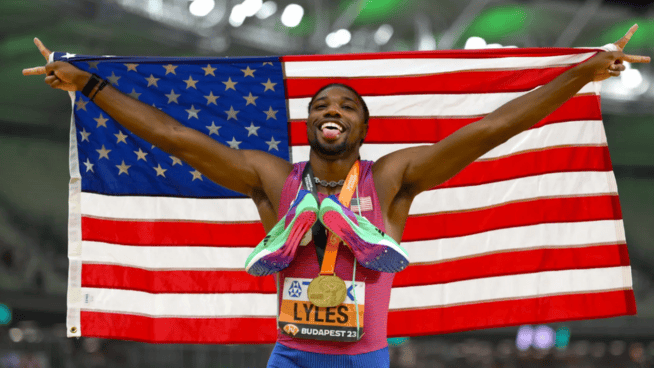10 Stoic Lessons for Every Athlete
Central to the core of Stoic philosophy asks the student: ‘Is this within my control?’. For every action, there is a reaction. Therefore, it is within our reasoned choice in how we respond to adversity. Stoics throughout history occupied the highest positions of leadership. Kings to presidents to Super Bowl-winning coaches, these four cardinal virtues have guided them all.
Courage. Justice. Wisdom. Temperance.
These virtues represent your agency. They represent your ability to live a life of happiness and fulfillment. For the athlete, these define your character. They ask you to demand the best for yourself and your teammates in the face of hardship. They represent your agency to WIN.
Here are ten lessons from Stoicism that will teach you how to be a better athlete and teammate.
On Teamwork
“Because a thing seems difficult for you, do not think it impossible for anyone to accomplish” – Marcus Aurelius.
Marcus Aurelius, the Roman king, knew what it took to assemble a team. He was keenly aware of his inadequacies which favored his reliance on others to fill the void. As an athlete, you’d do well to play your strengths while relying on your teammates to fill in the gaps. Bill Belichick embodies his team aphorism ‘Do Your Job’ that signals to every player they have a specific responsibility to execute. Everybody has a role. Some may seem demanding to you but not to others.
On Preparation
“Luck is what happens when preparation meets opportunity” – Seneca.
Success on the field is always a matter of preparation. Sports require deliberate practice and strategy. Without them, you are less likely to win. Steph Curry practices shooting the same shots in the same sequence before every game. Why? Because he needs to be automatic. He is preparing for a game-winning three-pointer. Think about the chaos in a typical NBA game. Great athletes have the instincts to succeed when an extraordinary opportunity presents itself. Thus, you’ll never be surprised if it’s something you’ve been preparing for all along.
On Reflection
“We need to regularly stop and take stock; to sit down and determine within ourselves which things are worth valuing and which things are not; which risks are worth the cost and which are not. Even the most confusing or hurtful aspects of life can be made more tolerable by clear seeing and choice.” – Epictetus.
Self-reflection will help clarify your decision-making. Ask yourself questions like Is this working? or What am I missing? The Stoics believed in eliminating the excess in every situation. Evaluate your current system and see if you’re wasting time with trivial endeavors. If it doesn’t work, get rid of it. MLB pitchers will routinely modify their pitch selection. They may eliminate a pitch or substitute it in favor of a new one. Those pitchers that fail to adapt will be demoted or left behind. Your situation is no different. Reflection will be a competitive advantage long-term.
On Decision Making
“More is lost by indecision than wrong decision. Indecision is the thief of opportunity. It will steal you blind.” – Cicero.
Sometimes you must go for it. Trust in yourself, your team, and your preparation. Taking a calculated risk is better than no risk at all. Otherwise, you’ll be left thinking of what could’ve been. Remember, indecisiveness is a decision within itself. Hockey coaches will regularly pull their goalies out of the net towards the end of a close game. The risk is an open net in favor of the extra man advantage. The lesson here is to take bold action. Uncertainty is an inevitable part of decision-making that will scare you into doing nothing.
On Courage
“To bear trials with a calm mind robs misfortune of its strength and burden.” – Seneca.
Much of what we tell ourselves will happen never comes to fruition. We are robbing our minds of optimism. Seneca says the way we interpret our misfortunes will strengthen our character. Have the courage to see it through to the end. Boxers will endure multiple rounds of combat with hopes of a KO or a decision at the end of the fight. They will not win each round, but they will bear them the same. To see it through is approaching each round with a calm mind. That is true courage. Jackie Robinson openly fought against oppression and racial discrimination in baseball. He tolerated the adversity to secure a brighter future for African American athletes. Take the lesson that courage will alleviate the undue pressures that burden your mind.
On Failure
“The impediment to action advances action. What stands in the way becomes the way.” – Marcus Aurelius.
Every road to success has obstacles. Obstacles are growth opportunities. Stoics lived during some of the harshest times in human history. Wars, famine, disease, and political upheaval were familiar threats. Without these trials, democracy may have never prevailed. What currently stands in your way becomes the way. Permit yourself to fail. And do it often. Michael Jordan was notorious for using his failures as fuel. Referencing the 9,000 shots he missed in his career, he attributed it to his success. As you learn from your failures, your maturity will elevate, and you’ll avoid making the same mistakes again.
On Standards
“How long are you going to wait before you demand the best for yourself?” – Epictetus.
Set the standard in your athletic pursuits. How do you want to show up? What do you want to be known for doing? To be the best requires you to demand the best from yourself. Without standards, you have no guiding principles. How can you expect to succeed without an underlying reason for your actions? Lebron James is the pinnacle athlete. He demonstrates standards through his leadership and community service. His goal is to direct real change amongst his teammates. Just like him, know your values and don’t compromise.
On Change & Growth
“If anyone can refute me––show me I’m making a mistake or looking at things from the wrong perspective––I’ll gladly change. It’s the truth I’m after, and the truth never harmed anyone.” – Marcus Aurelius.
Be open to change. Change means you learned something. You’re not the same athlete you were five years ago. Pursue the truth to bolster your decision-making. You may have to change your style of play according to your opponent. Baseball pitchers adjust their timing to throw off hitters. Your coach may put you in man coverage instead of zone. The best athletes adjust when provided with new evidence to help them achieve.
On Achievement
“What man actually needs is not a tensionless state but rather the striving and struggling for some goal worthy of him.” – Viktor Frankl.
High achievement is a direct reflection of proper goal setting. You’ll train your body to endure the physical demands of competition. You’ll study the playbook in preparation for the game. What follows is purpose-driven work. To follow through with your goals requires a balance between struggle and stride which ultimately gives your work meaning. The Stoics will have you focus on your behaviors. Forget about the politics and hurdles that are out of your control. Control the behaviors that are fundamental to your success.
On Leadership
“I begin to speak only when I’m certain what I’ll say isn’t better left unsaid.” – Cato.
Leaders know what to say and when to say it. They are the pulse of any team. Allow your words to carry meaning. The person that always speaks will eventually be tuned out. Consider the difference between sayers and doers. The former will preach about leadership. The latter will demonstrate it through their actions. Listen carefully to the needs of your teammates. You’ll eventually command respect among your peers who look to you for guidance.
RECOMMENDED FOR YOU
MOST POPULAR
10 Stoic Lessons for Every Athlete
Central to the core of Stoic philosophy asks the student: ‘Is this within my control?’. For every action, there is a reaction. Therefore, it is within our reasoned choice in how we respond to adversity. Stoics throughout history occupied the highest positions of leadership. Kings to presidents to Super Bowl-winning coaches, these four cardinal virtues have guided them all.
Courage. Justice. Wisdom. Temperance.
These virtues represent your agency. They represent your ability to live a life of happiness and fulfillment. For the athlete, these define your character. They ask you to demand the best for yourself and your teammates in the face of hardship. They represent your agency to WIN.
Here are ten lessons from Stoicism that will teach you how to be a better athlete and teammate.
On Teamwork
“Because a thing seems difficult for you, do not think it impossible for anyone to accomplish” – Marcus Aurelius.
Marcus Aurelius, the Roman king, knew what it took to assemble a team. He was keenly aware of his inadequacies which favored his reliance on others to fill the void. As an athlete, you’d do well to play your strengths while relying on your teammates to fill in the gaps. Bill Belichick embodies his team aphorism ‘Do Your Job’ that signals to every player they have a specific responsibility to execute. Everybody has a role. Some may seem demanding to you but not to others.
On Preparation
“Luck is what happens when preparation meets opportunity” – Seneca.
Success on the field is always a matter of preparation. Sports require deliberate practice and strategy. Without them, you are less likely to win. Steph Curry practices shooting the same shots in the same sequence before every game. Why? Because he needs to be automatic. He is preparing for a game-winning three-pointer. Think about the chaos in a typical NBA game. Great athletes have the instincts to succeed when an extraordinary opportunity presents itself. Thus, you’ll never be surprised if it’s something you’ve been preparing for all along.
On Reflection
“We need to regularly stop and take stock; to sit down and determine within ourselves which things are worth valuing and which things are not; which risks are worth the cost and which are not. Even the most confusing or hurtful aspects of life can be made more tolerable by clear seeing and choice.” – Epictetus.
Self-reflection will help clarify your decision-making. Ask yourself questions like Is this working? or What am I missing? The Stoics believed in eliminating the excess in every situation. Evaluate your current system and see if you’re wasting time with trivial endeavors. If it doesn’t work, get rid of it. MLB pitchers will routinely modify their pitch selection. They may eliminate a pitch or substitute it in favor of a new one. Those pitchers that fail to adapt will be demoted or left behind. Your situation is no different. Reflection will be a competitive advantage long-term.
On Decision Making
“More is lost by indecision than wrong decision. Indecision is the thief of opportunity. It will steal you blind.” – Cicero.
Sometimes you must go for it. Trust in yourself, your team, and your preparation. Taking a calculated risk is better than no risk at all. Otherwise, you’ll be left thinking of what could’ve been. Remember, indecisiveness is a decision within itself. Hockey coaches will regularly pull their goalies out of the net towards the end of a close game. The risk is an open net in favor of the extra man advantage. The lesson here is to take bold action. Uncertainty is an inevitable part of decision-making that will scare you into doing nothing.
On Courage
“To bear trials with a calm mind robs misfortune of its strength and burden.” – Seneca.
Much of what we tell ourselves will happen never comes to fruition. We are robbing our minds of optimism. Seneca says the way we interpret our misfortunes will strengthen our character. Have the courage to see it through to the end. Boxers will endure multiple rounds of combat with hopes of a KO or a decision at the end of the fight. They will not win each round, but they will bear them the same. To see it through is approaching each round with a calm mind. That is true courage. Jackie Robinson openly fought against oppression and racial discrimination in baseball. He tolerated the adversity to secure a brighter future for African American athletes. Take the lesson that courage will alleviate the undue pressures that burden your mind.
On Failure
“The impediment to action advances action. What stands in the way becomes the way.” – Marcus Aurelius.
Every road to success has obstacles. Obstacles are growth opportunities. Stoics lived during some of the harshest times in human history. Wars, famine, disease, and political upheaval were familiar threats. Without these trials, democracy may have never prevailed. What currently stands in your way becomes the way. Permit yourself to fail. And do it often. Michael Jordan was notorious for using his failures as fuel. Referencing the 9,000 shots he missed in his career, he attributed it to his success. As you learn from your failures, your maturity will elevate, and you’ll avoid making the same mistakes again.
On Standards
“How long are you going to wait before you demand the best for yourself?” – Epictetus.
Set the standard in your athletic pursuits. How do you want to show up? What do you want to be known for doing? To be the best requires you to demand the best from yourself. Without standards, you have no guiding principles. How can you expect to succeed without an underlying reason for your actions? Lebron James is the pinnacle athlete. He demonstrates standards through his leadership and community service. His goal is to direct real change amongst his teammates. Just like him, know your values and don’t compromise.
On Change & Growth
“If anyone can refute me––show me I’m making a mistake or looking at things from the wrong perspective––I’ll gladly change. It’s the truth I’m after, and the truth never harmed anyone.” – Marcus Aurelius.
Be open to change. Change means you learned something. You’re not the same athlete you were five years ago. Pursue the truth to bolster your decision-making. You may have to change your style of play according to your opponent. Baseball pitchers adjust their timing to throw off hitters. Your coach may put you in man coverage instead of zone. The best athletes adjust when provided with new evidence to help them achieve.
On Achievement
“What man actually needs is not a tensionless state but rather the striving and struggling for some goal worthy of him.” – Viktor Frankl.
High achievement is a direct reflection of proper goal setting. You’ll train your body to endure the physical demands of competition. You’ll study the playbook in preparation for the game. What follows is purpose-driven work. To follow through with your goals requires a balance between struggle and stride which ultimately gives your work meaning. The Stoics will have you focus on your behaviors. Forget about the politics and hurdles that are out of your control. Control the behaviors that are fundamental to your success.
On Leadership
“I begin to speak only when I’m certain what I’ll say isn’t better left unsaid.” – Cato.
Leaders know what to say and when to say it. They are the pulse of any team. Allow your words to carry meaning. The person that always speaks will eventually be tuned out. Consider the difference between sayers and doers. The former will preach about leadership. The latter will demonstrate it through their actions. Listen carefully to the needs of your teammates. You’ll eventually command respect among your peers who look to you for guidance.











